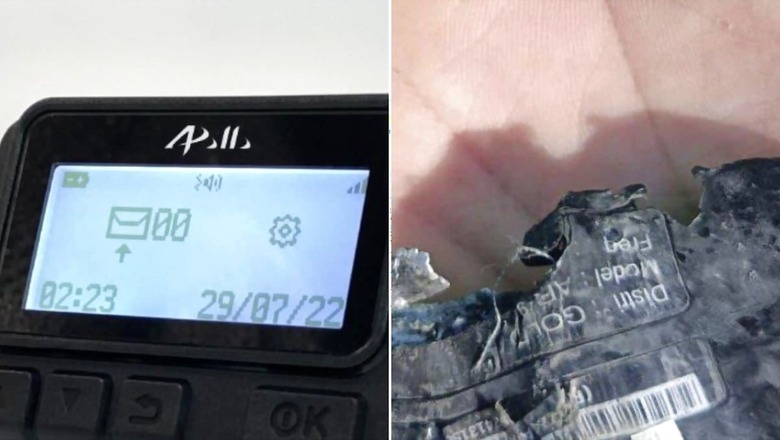
views
On 18-19 September, in the small country of Lebanon, two waves of explosions occurred. These were not large explosions or airstrikes, but something much smaller—and truly innovative. Over those two days, thousands of targeted pagers and walkie-talkies exploded in the hands of users, killing 37 people and injuring at least 3,000, with many cases resulting in blindness. The general perception is that these explosions were carried out by the Israeli government, targeting the terrorist group Hezbollah.
What was particularly interesting was how the Israeli intelligence agency managed to hack the pagers. They created a fake company in Hungary that supplied the pagers to Lebanon, using a Taiwanese manufacturer. These pagers, ordered by Hezbollah, were implanted with 3-5 grams of explosives. They functioned normally for many months, but when a special message was sent to them, they exploded as soon as the message was read.
This is alarming. It is not the first time that a country has hacked hardware for spying purposes. The Chinese tech giant Huawei has been banned in many countries due to suspected spying for the Chinese government. In 2020, the US government ordered the removal of over 24,000 pieces of Made-in-China communication equipment from mobile towers across the country, as they suspected that the Chinese military might be using this equipment, installed at height, to conduct secret surveillance on US military and government installations.
All of these incidents serve as significant warnings for India. As a major economic and military power, we have many adversaries who would go to great lengths to conduct surveillance and manipulate our government agencies, media, and citizens using rigged hardware.
What should we do to protect the nation against this rising menace?
First, we need to establish several national and state-level laboratories for hardware testing, especially for devices coming from foreign agencies. High-tech hardware surveillance testing labs should be built in every state, where citizens can also have their devices tested. Random audits of hardware being used by the government need to be mandated, and these labs will be the backbone of this initiative. A suitable location for establishing such state-of-the-art hardware testing labs would be a university in the state capital.
Second, there must be a large-scale public awareness campaign. How many of us know when our phones are actually listening to us, even when they are not in use? Many apps often use secret listening and our search history to present ads to us. Hardware frequently used in homes and offices, such as security cameras, stores data on servers that are not even located in India. Such low-cost equipment, often made in China, is prone to leaking data to foreign entities.
Third, the involvement of foreign players in large-scale building projects needs to be limited, and anti-spying initiatives must be undertaken during the construction phase. In 2018, the Chinese government was accused of spying inside the African Union Headquarters using listening devices that sent data to Shanghai every night. Chinese companies have constructed 186 government buildings in African countries, raising fears that such spying devices were installed at the time of construction, making it much harder to detect where such hardware has been secretly placed. These buildings are key target areas, especially if they are located close to significant military and government locations.
Four, we need to massively ramp up our own digital device manufacturing. This should not be limited to assembling phones using components sourced from other parts of the world, but should also include manufacturing these parts ourselves. We must also remember that secret surveillance, even on a large scale, can occur through equipment not meant for communication—such as televisions, music players, projectors, and even some cars. All devices connected to the internet are at risk of being rigged. This means India needs to accelerate its semiconductor plan. We should also focus on a national electronics mission to produce the maximum number of components for any electronic device within our borders. This will also act as a significant employment booster for our youth.
As the new world order emerges, India is gaining a key position among nations. We will be under constant scrutiny, with our missions of critical importance to the world. There will be increasing attempts by foreign governments and hostile organisations to deploy rigged hardware to spy on India. The preparedness of law enforcement agencies and the awareness of citizens will be crucial to overcoming such efforts.
The author is Founder, Dr. Kalam Centre and Homi Lab and former Advisor to Dr. APJ Abdul Kalam. Views expressed in the above piece are personal and solely that of the author. They do not necessarily reflect News18’s views.


















Comments
0 comment